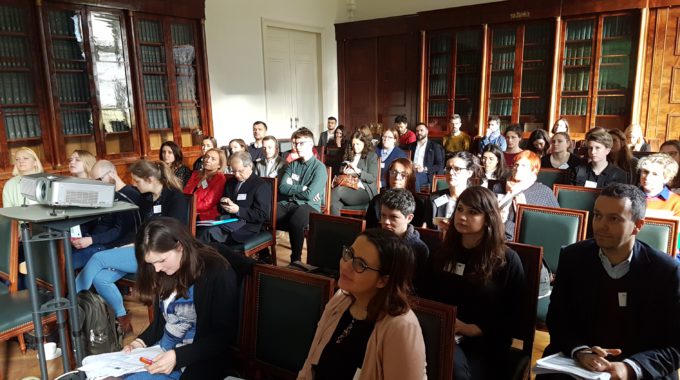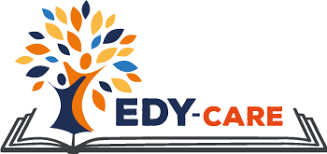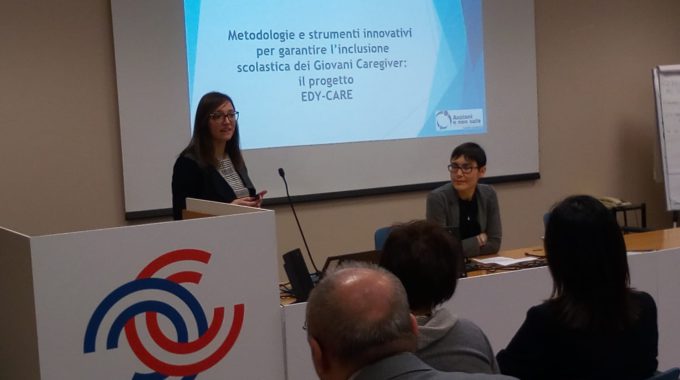
The impact of caring on education and social inclusion: an assessment tool
The EDY-CARE project aims to empower teachers and other school staff (e.g., school nurses, psychologists, social workers, management) in upper secondary education to recognise adolescent young carers (16-19 years old) in classes and maximize their learning opportunities, while ensuring their social inclusion.
The project is funded by the European Union through the Erasmus+ programme and brings together universities and NGOs from Sweden, Italy, Slovenia and Portugal, as well as the European network Eurocarers.
The first activity of the project consisted in developing, testing and piloting an assessment tool, to be filled in by the students, aimed to determine the amount of caring activities a young person does for his/her family, as well as the (perceived) impact of caring on their educational experience and social inclusion.
The task was led by University of Ljubljana. The tool was piloted in three classes, reaching out 400, 69, 43 and 58 students, respectively in Slovenia, Sweden, Italy and Portugal.
The Edy-Care assessment tool is highly innovative, since in the countries involved in the partnership there is no evidence of a similar tool in use in school contexts.
The tool builds on the Multidimensional Assessment of Caring Activities (MACA-YC18)[1], an 18-item self-report questionnaire that asks young people about the frequency of they activities they carry out at home. These activities are grouped in 6 main categories:
- Domestic Activity (e.g. cleaning, cooking, washing dishes or clothes etc.);
- Household Management (e.g. shopping, household repairs and lifting heavy objects etc.);
- Financial and Practical Management (e.g. helping paying the bills, working part-time etc.);
- Personal Care (e.g. helping the person dress and undress, wash and use the bathroom, administering medicine or changing dressings etc.);
- Emotional Care (e.g. keeping an eye on them, providing supervision and taking them out);
- Sibling Care (looking after siblings either alone or with a parent present.)
Each item is rated on a 3-point scale where ‘never’ = 0, ‘some of the time’ = 1, and ‘a lot of time’ = 2. The lowest the young person can score is 0 (indicating that no care activities take place) and the highest the young person can score is 36. In the UK, the average score is around 14. Scores of 14-17 indicate a high amount of caring activities, and a score of 18 demonstrates a very high amount of caring.
Very early in the process of developing the questionnaire, the Edy-Care project partners realized that the MACA tool is country context sensitive. In other words, the average score that in the UK allows to distinguish young carers versus non young carers proved to be too low in the project countries. Indeed, in these countries a variety of life situations may lead a young person to implement a high amount of activities at home (hence, higher MACA scores) without him/her being a carer. This is the case, for example, of a young person carrying out a large amount of household tasks because s/he lives in a single parent household or the situation of a young person looking after siblings as both the parents work full time.
Given this finding, the project partners expanded the MACA questionnaire by a series of follow-up items, to assess whether the young person implements extra tasks at home because of his/her caring responsibilities or because of other life situations.
Another important finding is the fact that there is no average young carer: the specific life situations of young carers depend on the types and amounts of caring activities they provide. So for example, a young carer looking after a sibling would carry out a different set of activities on a specific intensity scale than a young carer who provides care to a grandmother.
Identifying young carers in classes is a first, important step towards young carers friendly schools. Once young carers have been identified, they need to be provided with support.
Small changes in schools (i.e. adjustments in educational strategies and didactical approaches) can result in big changes for the life of young carers, allowing them to achieve their full potential and to reach their goals in life.
The Edy-Care project partners are currently working on a toolkit, a handbook and an open online course (MOOC), in order to empower schools professionals and make young carers friendly schools a reality.
The assessment tool can be accessed here.
The Report explaining the methodology behind the development of the tool can be accessed here.
To know more about the Edy-Care project, visit the project website.
To know more about the activities implemented at national level, please contact the projects partners.
To know more about policy developments and advocacy activities on the topic of young carers, please contact Francesca Centola, Eurocarers Coordinator activities with and for young carers.
[1] MACA-YC18 Copyright © 2012 Fiona Becker, Saul Becker, Stephen Joseph & Steve Regel. All rights reserved. Developed for Carers Trust by Young Carers International Research and Evaluation, School of Sociology and Social Policy, University of Nottingham, University Park, Nottingham NG7 2RD.





